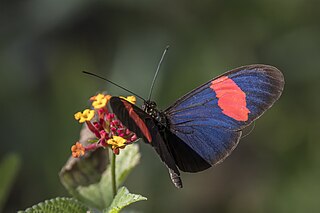A hole is a hollow place, an opening in/through a solid body, or an excavation in the ground.

In Greek mythology, Melpomene is the Muse of tragedy in Greek mythology. She is described as the daughter of Zeus and Mnemosyne along with the other Muses, and she is often portrayed with a tragic theatrical mask.
In Greek mythology, Plexippus or Plexippos is a name that refers to:

The Agelenidae are a large family of spiders in the suborder Araneomorphae. Well-known examples include the common "grass spiders" of the genus Agelenopsis. Nearly all Agelenidae are harmless to humans, but the bite of the hobo spider may be medically significant, and some evidence suggests it might cause necrotic lesions, but the matter remains subject to debate. The most widely accepted common name for members of the family is funnel weaver.
Neon is a chemical element with symbol Ne and atomic number 10.

Heliconius cydno, the cydno longwing, is a nymphalid butterfly that ranges from Mexico to northern South America. It is typically found in the forest understory and deposits its eggs on a variety of plants of the genus Passiflora. It is a member of the Heliconiinae subfamily of Central and South America, and it is the only heliconiine that can be considered oligophagous. H. cydno is also characterized by hybridization and Müllerian mimicry. Wing coloration plays a key role in mate choice and has further implications in regards to sympatric speciation. Macrolide scent gland extracts and wing-clicking behavior further characterize this species.
Eris most often refers to:

Heliconius melpomene, the postman butterfly, common postman or simply postman, is a brightly colored, geographically variable butterfly species found throughout Central and South America. It was first described by Carl Linnaeus in his 1758 10th edition of Systema Naturae. Its coloration coevolved with another member of the genus, H. erato as a warning to predators of its inedibility; this is an example of Müllerian mimicry. H. melpomene was one of the first butterfly species observed to forage for pollen, a behavior that is common in other insect groups but rare in butterflies. Because of the recent rapid evolutionary radiation of the genus Heliconius and overlapping of its habitat with other related species, H. melpomene has been the subject of extensive study on speciation and hybridization. These hybrids tend to have low fitness as they look different from the original species and no longer exhibit Müllerian mimicry.
Seven ships of the Royal Navy have been named HMS Melpomene after the Muse of Tragedy in ancient Greek mythology.

Representations or analogues of one or more of the nine Muses of Greek mythology have appeared in many different modern fictional works.
William Witman II was an American diplomat. He graduated from Yale University in 1935 and joined the United States Foreign Service the same year. He was appointed as United States Ambassador to Togo from 1964 to 1967. He retired from the foreign service in 1974. He married Melpomene "Melpo" Sasalios and died in 1978. His wife died in 2006.

Melpomene is a genus of ferns in the family Polypodiaceae, subfamily Grammitidoideae, according to the Pteridophyte Phylogeny Group classification of 2016 (PPG I).
Melpomene is a genus of funnel weavers first described by O. Pickard-Cambridge in 1898. They range from southwestern U.S. to Panama and can grow up to 7 to 8.5 millimetres long. Roth and Brame noted that, with many undescribed species, the genus appears to be a catchall or "wastebasket taxon" for several unrelated species that may represent several genera.

The comedy and tragedy masks are a pair of masks, one crying and one laughing, that have widely come to represent the performing arts. Originating in the theatre of ancient Greece, the masks were said to help audience members far from the stage to understand what emotions the characters were feeling.

Melpo Axioti was a Greek writer who professed to Communism. She wrote in modern Greek. She spent most of her exile from 1947 to 1964, in the German Democratic Republic.
In Greek mythology, Pisinoe or Peisinoe may refer to two individuals:

In Greek mythology, Ligeia or Ligia may refer to two personages:
This page is based on this
Wikipedia article Text is available under the
CC BY-SA 4.0 license; additional terms may apply.
Images, videos and audio are available under their respective licenses.






